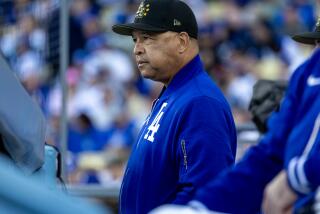Donald Fehr takes a cautious approach to leading NHL players
- Share via
From Raleigh, N.C. — A month into his tenure as executive director of the NHL Players’ Assn., Donald Fehr is steering a cautious course while rebuilding a union shattered by the labor dispute that wiped out the 2004-05 season.
“Obviously I’m choosing my words carefully. I’m not choosing to make news here,” Fehr said during an interview Saturday, the eve of the league’s All-Star game.
Being guarded contradicts the reputation he built while leading the Major League Baseball Players Assn. through a victorious collusion case against owners after he took over in 1983 and a strike that triggered the cancellation of the 1994 World Series. He also presided over years of labor peace before he left in 2009.
But Fehr, an advisor to the NHLPA for two years before becoming its leader, is wise to step carefully while he becomes familiar with his new constituents and their issues. This much he would say: He has not scheduled talks with Commissioner Gary Bettman regarding the collective bargaining agreement, which expires Sept. 15, 2012.
“That will be at least months and maybe as long as a year before that happens,” Fehr said. “Have I talked to Gary a number of times? Sure. We would expect to and there’s ongoing relationships between the offices all the time.”
Fehr’s priority is to stabilize the union following a tumultuous era in which Bob Goodenow resigned in mid-negotiation and two successors were ushered out the door. In talking with players Fehr has discerned a clear theme.
“They would like to have an organization that they can feel confident in, that they can feel proud of and satisfied that they are a member of,” he said, “and that they think can represent them efficiently in two separate areas, one of which is the basic collective bargaining and the second is the administration of the bargaining agreement. And I think there is a generalized recognition in the five years since Bob left they felt those two particular aspects weren’t being executed nearly as well as they could have been. That’s a fair way to put it.”
Fehr, 62, doesn’t need this job — or any other. He took it on, he said, because he came to like the players he was advising.
There is a challenge for him, too, in growing a game that lags behind football, baseball and basketball in popularity and revenues in the United States.
“There was a need in this organization to remind the players that, to a large extent, the future’s in their own hands and that they’re fully capable of determining it if they want to,” he said.
Some of the terrain is familiar, but Fehr is becoming versed in the symbiotic relationship between Canadians who consider the game their own and Americans whose money has brought the majority of franchises south. An American commissioner is bad enough for many Canadians. An American as head of the union seems a double insult.
Not so, Fehr said, adding that he represented the interests of baseball players from many cultures.
“I hear that, but … the issue is not do you look at the game the way an American, or a Canadian or a Swede or a Russian does. Or anybody else,” he said. “The question is do you look at your position as one in which your object is to serve the best interests of the players as a group. And that really doesn’t have much to do with nationality.”
Economics are an obvious difference between the NHL and Major League Baseball. Bettman said Saturday that the NHL is on pace for revenue growth of about 5%, to about $2.9 billion. Major League Baseball’s 2010 revenues were about $7 billion.
“There’s 30 different operations and people say hockey doesn’t have revenue compared to the other sports, but it has more revenue now than baseball did when we started doing this,” Fehr said. “Baseball revenue overall in ‘93, I think it was between 1.8 and 1.9 and it hit just under 3 billion 11 or 12 years ago, which is roughly where hockey is. That’s where we started.”
Fehr is exploring the issue of blows to the head, a tricky one because it involves some of his constituents harming other constituents. He declined to state a position because “it’s something I want to be very certain I understand.” He is intrigued by hockey’s growth potential in northern Europe and said when discussing participation in the Olympics that players have generally been positive, but that he does not foresee a resolution within the next six months.
There’s that caution again.
“You’ve got to remember the bargaining agreement is not up for 19 months,” he said. “And whenever you go into bargaining there’s a lot of information that you’re going to want to have and you’re going to want to share with the other side, but you’ve got to do your own homework first.”
twitter.com/helenenothelen
More to Read
Go beyond the scoreboard
Get the latest on L.A.'s teams in the daily Sports Report newsletter.
You may occasionally receive promotional content from the Los Angeles Times.











